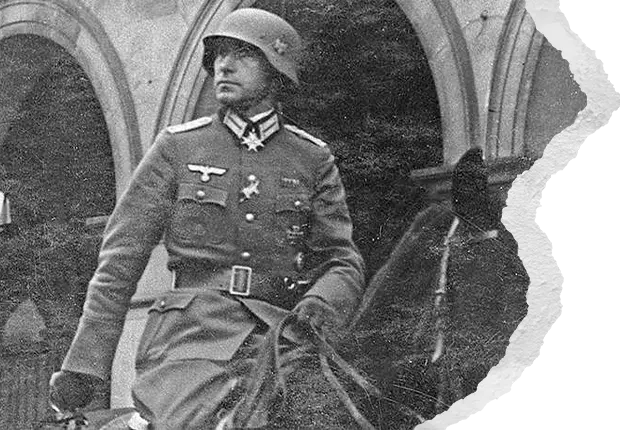Blood (from Combat as Inner Experience)
The lineage of man is a mysterious, labyrinthine jungle whose crown, enshrouded in the mist from a boundless sea, stretches ever more majestic from the damp, dull swelter towards the limpid sun. While the will to beauty encrusts the peak with flowers, perfumed and colorful, there in the depths a riot of weird growth proliferates. As the dusk sun wanes, a row of red parakeets alight upon the crest of swaying palms like a squadron of kingly dreams. From an undergrowth already submerged in night, the chaotic back and forth of creeping and crawling animals menace – torn from sleep, the lair, the warm nest – there the screeching howl of victims, the silent assault of greedy tooth and claw, deft at dealing death.
Just as the jungle strains ever more looming and massive towards the heights, feeding on the detritus of its feculent floor, powers of growth from its own disintegration; so too each new generation of mankind takes root in a ground stratified by the rot of countless previous ones who repose there after the whirl of life is through. Indeed the bodies of those deceased, their dance now done, are as nothing, scattered in the fleeting sand or decaying on the floor of the sea. In ceaseless exchange, however, their particles, their atoms are seized again by the living, the victorious eternally young, and thus elevated to the eternal source of vital energy.
Eternal worth belongs as well to the substance of life’s existence: every thought, every deed, every feeling that quickened this endless series of predecessors through life’s realm. Just as mankind is formed from the animal and its needs, he is rooted in everything that his forefathers created through fist, mind, and heart over the course of ages. His lineage is like the layers of a coral reef – each piece is inconceivable without those beings, innumerable and long extinct, upon which it is based. Man is the bearer, the continually changing vessel of all that which before him was done, thought, and felt. He is also the legacy of every aspiration which once drove others with an irresistible force towards distant, dark ends.
As ever, mankind is at work on a tower of immeasurable height for whose sake it stacks generation upon generation, the state of its being in blood, agony, and desire.
The tower may vault to ever more precipitous heights, its battlements elevating mankind to overlord, offering ever greater, richer lands to view – still the construction does not proceed in easy equipoise. The work is often threatened; walls collapse or are torn down by fools, doubters, and the discouraged. The reversal of conditions long thought overcome, the outbreak of elemental violence bubbling beneath the stiff crust, reveals the vital power of primal forces.
The individual is also composed of countless building blocks. The endless succession of ancestors weighs on him. He is enchained and encased by thousands of bonds, invisible strands in the rootwork of the jungle marsh whose festering warmth breeds germinal growth. Wildness, brutality, the toxic tint of the drives, has indeed been levelled, smoothed over, and dampened during the eons in which society has bridled impulsive desires and pleasures. And although increasing refinement has certainly purified and ennobled him, animality still slumbers at the base of his being. There is as always much animal in him, sleeping under covers of habit and conformity on the plush rug of a polished, venal, seamlessly networked civilization. The mask drops, however, when life’s arc swings back to primal red: he bursts forth naked as ever, the first man, the cave dweller in the full boundlessness of his unfettered drives. As life recalls its first functions, the patrimony of his forefathers burns in him again. Blood now boils where formerly it circulated cool and constant through his veins in the mechanical pulsation of those stony skeletons called cities. And though it rested for a long time hard and cold in hidden depths, the archaic stratum melts again in a white-hot glow. It hisses about him – blaze, blast, annihilating eruption – whenever he descends into those snarling shafts. Riven by hunger, in the breathless braiding of the sexes, in mortal encounter: he is ever the ancient one.
In combat that shreds all human accord like a beggar’s tattered rags, the animal ascends as an arcane monstrosity from the soul’s deep. There it fires high as an all-consuming flame, as an irresistible delirium intoxicating the masses, a godhead enthroned above the host. Where all thought and every deed is reduced to formulaic simplicity, the emotions too must be molded and conform to the frightful simplicity of the goal: the annihilation of the opponent. And so it will remain as long as there are men.
In the moment of encounter, external form plays no part. Whether with splayed claws and bared teeth, by swinging a crudely-sharpened hatchet or drawing a wooden bow, or where precision technology has elevated annihilation to the finest art: the instant invariably arrives when the rush of red blood enflames the whites of the enemy’s eyes. The breathless lunge or the final, desperate maneuver always triggers the same emotional response, regardless of whether the fist wields a notched club or a hand grenade. No gruesome deed, no accretion of the most refined terror can saturate man with horror like the momentary apparition of his likeness emerging before him on the battlefield – be it a narrow pass between two hill tribes or the wide-ranging theater of modern warfare – where man always stakes his blood for decision, all the fire of prehistory in his contorted face. For all technology is machine-like, a mere matter of chance, a bullet blind and without will. Man, however, is driven by the will to kill in a storm of blast, iron, and steel; and when two men clash in the delirium of combat, two beings find themselves where only one may persist. These two beings have been placed in a primal relationship with one another: the battle for being in its most naked form. In this combat, the weaker must be laid low while the victor mounts his vanquished foe, his weapon held more tightly in his fist – deeper into life, deeper into the struggle. From his heart-wrenching scream, intermingling on impact with the cry of his enemy, glimmers the outline of eternity. It is a cry long forgotten in the flux of culture, a cry of recognition, horror, and blood thirst.
Even of blood thirst. Next to horror, this is the second element that breaks over the warrior like a torrent of red waves: intoxication, the thirst for blood when the billowing clouds of annihilation hang heavy above fields of wrath. Strange as it may seem to those who have never fought for their mortal existence, aside from utmost horror the sight of the opponent brings redemption from heavy and unbearable pressure. Only the limitless drive for love is related to the lust for blood, which whips about in war like a red storm-sail over a black galley. It innervates the womb of already inflamed cities when, showered by gleaming roses, the columns of soldiers parade to the train station. It smolders in the masses who are riled up with shouts of joy and shrill cries; it is a part of the feeling that rains down on the hecatombs, pacing to their death. Built up in the days before battle, in the painful tension on its eve, on the march to the front, in the zone of terrors before the final fight – the lust consumes itself finally in a roaring rage when the hail of bullets shatters the lines. All striving is concentrated into one wish: pounce on the opponent, seize him as the blood demands, without weapons, in the delirium, with the wild grip of the fist. It has been this way forever.
Such is the cycle of emotions, the struggle raging in the warrior’s breast as he wanders the flaming wastes of colossal battles: horror, fear, the intimation of annihilation, and the craving to release himself fully in battle. Should he lose his clarity of mind in moments forever unremembered, a self-contained microcosm raging through the vastness, wildness dammed to the point of bursting in a sudden explosion – does the blood flow in streams from his own wounds or that of another? – then a dark shroud descends over his eyes. He looks around, a sleepwalker stirred from oppressive dreams. A terrible dream which his animality dreamt where men fought together in hordes, continually in danger through the deserted steppes; it fades leaving him behind shocked, blinded by what is his own but unexpected, exhausted by the titanic extravagance of will and brutal force.
Only then does he realize the place where the advancing charge has miscalculated, realize the host of dangers from which he must run – and become pale. Courage first begins beyond these limits.

































